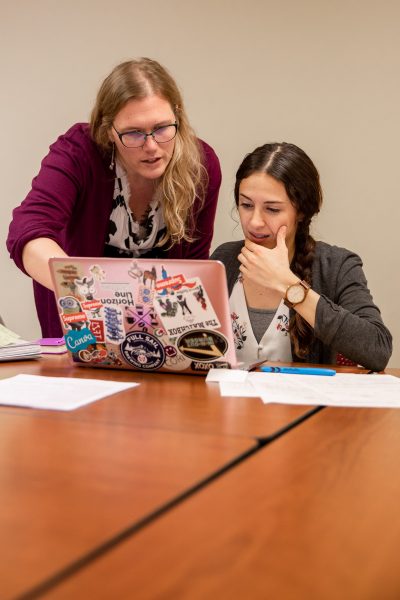A foundation for interdisciplinary collaboration
Author: Stacey Maifeld
Author: Stacey Maifeld
On Maddie Huinker’s calendar, there is a two-hour window every week marked “lab.”
“My friends always say, ‘I thought you were working in a lab coat with goggles and syringes,’” she said. “And it’s not like that.”
Instead, Huinker’s lab for the last two years has been a conference room in Hamilton Hall, where she collaborates with undergraduate and graduate students from diverse disciplines on research and independent projects under the guidance of Dara Wald.
Wald, who has a Ph.D. in wildlife ecology, is an assistant professor of journalism in Iowa State University’s Greenlee School of Journalism and Communication. She studies environmental conflict and collaboration and public engagement in science, and brought the life sciences model of a lab to Greenlee. The lab creates a space where students learn the foundations of research as it relates to science communication.
Lab members represent backgrounds as diverse as computer science, public relations and environmental science. On any given day, you’ll find a computer science major collaborating with a graduate student to code news articles, or a meteorology student practicing a trial run of her National Weather Service focus groups.
“At the beginning of each week, Dr. Wald checks in with all of us,” explained Huinker (’21 communication studies, environmental studies). “She usually starts with good news of someone receiving a grant, scholarship or internship. Then we’re all just there working on our laptops, using the surveys we’ve collected and reviewing data.”
When Huinker started in the lab, she was a first-year Honors student in the Open Option program. She wasn’t sure what she wanted to major in, but she had a clear picture in mind of research.

“I remember the first time meeting [Dr. Wald] I was so relieved,” Huinker said. “Getting into research, I imagined really stern scientists and she’s so not that. She’s so brilliant and also kind. She was open to us to explore and do what we wanted to do, but also still help meet her personal research goals.”
Huinker started out assisting with a research project on the role of fear and empathy messages in communicating about fracking.
“I jumped in late, but I got involved,” she said. “It was a really good introduction to data analysis and presenting research because I got to present that research at conferences.”
Huinker is now assisting with a project studying the role of trust and empathy in public communication. She attends ISU Lectures Program events to gather data on science lecturers who speak on topics such as climate change, genetically modified foods and resource conservation.
Emily Haberlack (’21 environmental science) also joined Wald’s lab through the first-year Honors program.
“I really enjoy research,” she said. “I don’t think I would have been as interested in it without Dr. Wald because she’s such a welcoming presence and so encouraging. Every day, I was coming back from the lab saying, ‘Oh my gosh, this was awesome.’”
For three years, Haberlack has been assisting with a systematic literature review trying to understand the role of empathy in science communication.
“We started with 5,000 articles and have been narrowing them down,” she said. “Once we got a smaller batch, we’ve been going through and qualitatively coding them. My adventure has been realizing how long the process actually takes to get all of this raw data that we see, and how much work and time goes into these giant statistics that organizations put out.”
When new people join their lab group, bringing their own disciplinary perspectives to the lab, Huinker and Haberlack said it pushes their research forward.
“We’re all working on different things, but there is still a collaborative element to it,” Haberlack said. “If one of us has a problem, everyone just stops and has a conversation together.”
“Research is such a learning curve, but it’s really cool because we always have an influx and outflow of students,” Huinker added. “It’s always interesting to bring new minds in. We just brought a new undergraduate student in, and she’s already changed our research, and we’re like ‘We never thought about it that way.’”
Both Huinker and Haberlack are recipients of the LAS Dean’s High Impact Award for Undergraduate Research. In 2018, they also traveled to Georgia together to present at the National Conference for Undergraduate Research.
“Dr. Wald is really actively advocating for students in research,” Haberlack said. “When we were accepted to the research conference, we were checking every avenue for funding. Dr. Wald worked hard with Greenlee to provide additional funds for students presenting research. She advocates for her students as much as possible, which is an amazing attribute for a mentor to have for students in research.”
Huinker, who discovered her majors because of her experiences in Wald’s lab, now plans to attend graduate school for nonprofit management. She believes research will help her get there.
“Research is a phenomenal thing to have under your belt when applying to graduate school,” she said. “Even though I may not do scientific research in my future, it will help me a lot. Dr. Wald just wants students to succeed. She’s supported me in everything that I’ve chosen to do.”
Read more about Dara Wald’s interdisciplinary research in the latest issue of Link magazine.